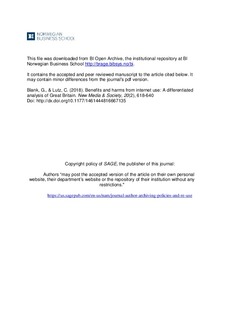Benefits and harms from Internet Use: A differentiated analysis of Great Britain
Journal article, Peer reviewed
Accepted version
Permanent lenke
http://hdl.handle.net/11250/2484920Utgivelsesdato
2018Metadata
Vis full innførselSamlinger
- Publikasjoner fra CRIStin - BI [1015]
- Scientific articles [2181]
Sammendrag
Recent studies have enhanced our understanding of digital divides by investigating outcomes of Internet use. We extend this research to analyse positive and negative outcomes of Internet use in the United Kingdom. We apply structural equation modelling to data from a large Internet survey to compare the social structuration of Internet benefits with harms. We find that highly educated users benefit most from using the web. Elderly individuals benefit more than younger ones. Next to demographic characteristics, technology attitudes are the strongest predictors of online benefits. The harms from using the Internet are structured differently, with educated users and those with high levels of privacy concerns being most susceptible to harm. This runs counter to intuitions based on prior digital divide research, where those at the margins should be most at risk. While previous research on digital inequality has only looked at benefits, the inclusion of harms draws a more differentiated picture.
Beskrivelse
The accepted and peer reviewed manuscript to the article
